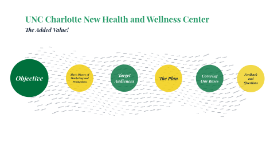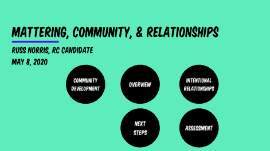UNC-W Presentation
Transcript: Mattering, Community, & Relationships Russ Norris, RC Candidate May 8, 2020 Community Is... Supportive Connection between others catalyzed by each individual mattering Overview Theoretical Framework Mattering and Marginality Attention -- We attain someone else's interest. We are noticed. Ex: My RA notices that I have not been present on the hall. Importance -- We are cared for. What happens to us matters. Ex: My conduct officer values my wellbeing by offering resources. Ego Extension -- We have people who are proud of us. And who will sympathize. Ex: Staff uses emotive language and validation via helping skills during crisis. Dependence -- Someone needs us. Ex: My input is needed in community standards. Appreciated -- Someone values our contributions. Ex: My positive bystander behavior received gratitude. Schlossberg, N.K. (1989). Marginality and mattering. Key issues in building community. New Directions in Student Services, 48. Rosenberg, M., and McCullough, B. C. "Mattering: Inferred Significance to Parents and Mental Health Among Adolescents." In R. Simmons (ed.), Research in Community and Mental Health. Vol. 2. Greenwich, Conn.: JAI Press, 1981. Assumptions Assumptions Locus of Control -- Pro & Student Staff, Community Development Model, Collaborative Relationships, Professional Development Identity-based community is essential, and not necessarily feasible at a macro-level. Physiological Needs -- Functional Physical Plant, Ability to Sleep & Eat, On-Campus Healthcare Resources Safety Needs -- Key Management, Emergency Resources, On-Call Staff, Risk Mitigation (e.g. fire safety systems), Identity-Related Safety Maslow, A. H. (1943). A theory of human motivation. Psychological Review, 50(4), 370–396. Community Development Community Development Consists of intentional, Outcomes-Driven Practices That Facilitate Mattering and Connection Events Community Development Events Noticed -- The value of 'series' events Dependence -- Leverage resident talent for events Importance -- Community-based needs assessments Ego-Extension -- Resident recognition events {e.g. birthdays, athletic wins, etc.} Passive Programs Passive Programming Attention -- Hall Playlists Dependence -- Twitter How To, RHA-delivered Programming Ego-Extension -- Newsletters, Bulletin Boards w/ Residents of the Week, etc. Importance -- Wellness Flyering, Signage Regarding Community Issues RA | REsident Check-Ins RA | Resident 1x1S Attention -- Presence, Mood, Responsiveness Importance -- Recollection of Past Interactions, Willingness to have Followup Interactions (not 1 and done), Persistence Ego-Extension -- Validation, Reflection, Emotive Language, Recognition (helping skills embedded in on-going RA Training -- must see this modeled) Dependence -- Leverage Connections (coaches, professors) on cCampus Appreciated -- Presence (hall meetings, returning messages); Compliment on Role Modeling Behaviors (ex: bystander intervention) Intentional Relationships Intentional RElationships Are Connections with students leveraged for Challenge, Support, and learning Conduct Conduct Importance -- Providing Resources, Seeking Holistic Picture Dependence -- Collaboration on Action Plan & Sanctions Ego-Extension -- Exercising Helping Skills, Recognizing Barriers or Struggles Supervision Supervision Attention -- Extra work completed, Resident Interaction, Follow through with Staff Requests, Acknowledge Unpopular Changes Importance -- Supervisor Attends Student Events, Exercise Flexibility Where Possible, Expand 1x1s to Include RAs and Para-Professionals and College Students Dependence -- Ownership of Incidents, In-Hall Collateral Assignments, Delegation at Staff Meetings Appreciated -- Staff Recognition (formal events), Callouts in Groupme & Staff Meetings Crisis Crisis & Helping SKills Attention -- Body Language, Spoken Langauge and Word Choice, Emotive Language Ego-Extension -- Identity Considerations (Knowledge, Skills, Dispositions) Importance -- Avoiding Procedure > Care, 'Not Your First Time, but Theirs...', Followup & Advocacy, Reestablishment of Control Dependence -- Encouraging Bystander Behavior, Leveraging Relationships Things to Learn 1. Know the resources 2. What kind of help-seeking behavior is present? 3. What cultures exist (athletics, greeks, etc)? What barriers (political, or otherwise) already exist? 4. What circumstances already facilitate community? [school spirit, physical space +/-, established traditions) 5. What kind of involvement already exists in LCs? 6. What assessments are available? What do they say? 7. What practices or culture, if any, was set by the preceding supervisor? Next STeps How Is Success Measured? 1. Program Attendance, Learning Outcome Assessment, Satisfaction Assessment, Retention 2. Informal RA Quizzes on Residents (1x1s) 3. Informal Metrics (Social Media Likes, Roommate Contracts & Mediations, Vandalism Frequency, IR Analysis] 4. Building Identity (E.g. What is it like to live in...) Assessment

















